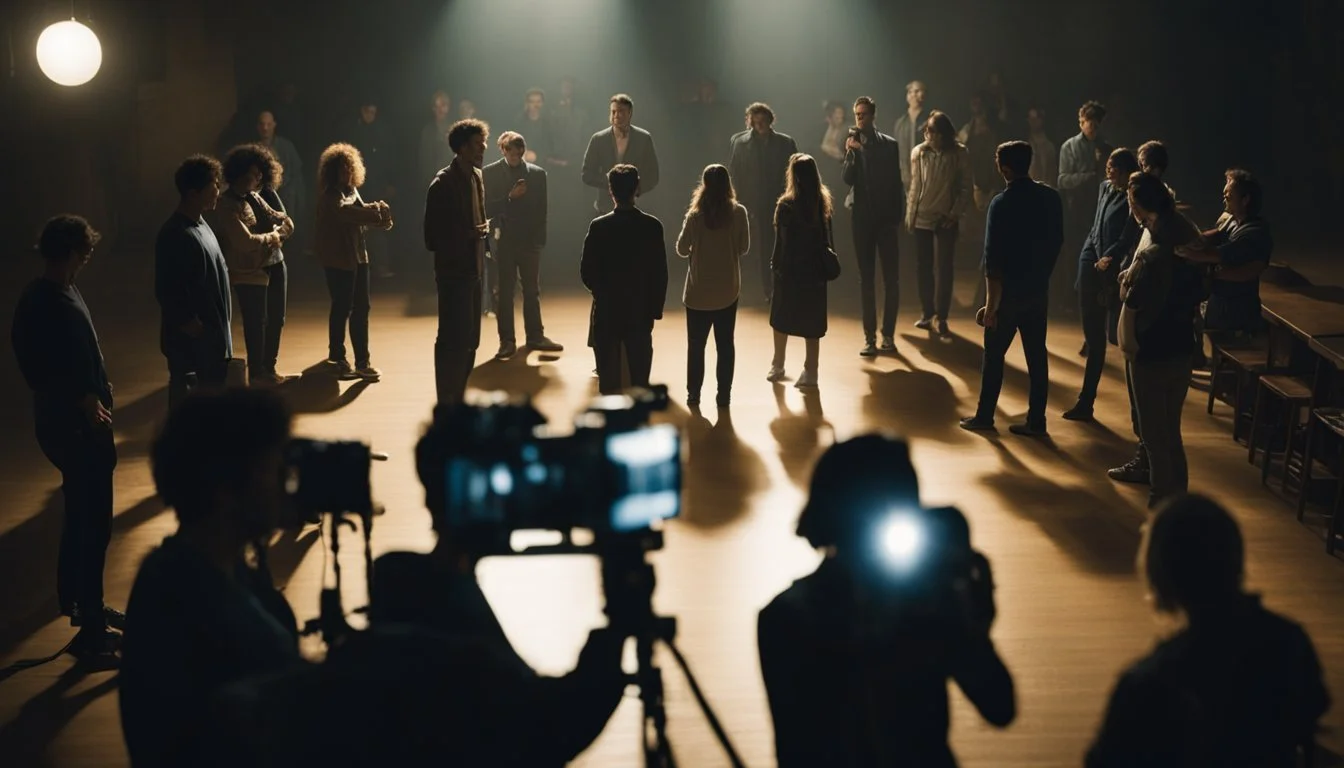Heidi Ewing: Illuminating Hidden Worlds and Subcultures Through Film
Heidi Ewing stands out as a masterful documentary filmmaker, uniquely adept at shining a light on hidden worlds and subcultures. Born in Cleveland, Ohio, in 1974, she honed her craft at New York University, where she graduated in 1998. Her compelling documentaries, such as the Academy Award-nominated "Jesus Camp," offer viewers an intimate glimpse into communities and issues often overlooked or misunderstood.
Throughout her career, Ewing has worked on a diverse range of projects with her frequent collaborator Rachel Grady. Films like "The Boys of Baraka," "12th & Delaware," and "DETROPIA" exemplify her talent for capturing raw, unfiltered narratives that resonate deeply with audiences. Ewing's recent work, including “Endangered,” continues this tradition by documenting the silencing of journalists around the world, showcasing her commitment to urgent, impactful storytelling.
Ewing's journey into filmmaking began with an intriguing night course taught by Ram Dass, which sparked her interest in documentaries. Her work at Loki Films, co-founded with Grady, underlines a dedication to creating films that not only educate but also inspire change.
Early Career and Inspiration
Heidi Ewing's journey into filmmaking reflects her profound curiosity about hidden worlds and subcultures. She has seamlessly transitioned from documentary filmmaking to narrative features, driven by an unyielding passion to tell untold stories.
Educational Background
Heidi Ewing's educational journey began in the Detroit area. She later attended the prestigious School of Visual Arts in New York City, where she honed her filmmaking skills. This institution provided her with a strong foundation in both technical aspects and creative storytelling.
Her experience at the School of Visual Arts was instrumental in developing her understanding of film as a medium to explore complex social issues and personal stories.
Influential Projects
Ewing's early work includes notable documentaries like "Jesus Camp" and "The Boys of Baraka."
"Jesus Camp" (2006) provided a raw and thought-provoking look into a charismatic Christian summer camp, earning her critical acclaim and an Academy Award nomination.
"The Boys of Baraka" (2005) followed African-American boys from Baltimore attending a school in Kenya, highlighting the educational system's inadequacies and societal challenges.
These projects established her reputation as a filmmaker unafraid to tackle controversial subjects and dive deep into the human experience.
Creative Vision
Heidi Ewing's creative vision centers on bringing marginalized voices to the forefront. Her work often features a blend of documentary realism with narrative storytelling, allowing for a nuanced exploration of her subjects.
Ewing's approach to filmmaking is both intimate and expansive, capturing personal moments while situating them within broader social contexts.
Her transition to narrative features, as seen in "I Carry You With Me," underscores her versatile storytelling ability. This film combines real-life documentation with scripted scenes, demonstrating her innovative style and commitment to authenticity.
Heidi Ewing's Filmmaking Style
Heidi Ewing's filmmaking style is distinctive for its blend of narrative and documentary techniques, compelling visual storytelling, and immersive character development.
Narrative Techniques
Ewing often utilizes a hybrid approach, merging documentary realism with narrative elements. In I Carry You With Me, she combines real-life footage with scripted scenes featuring actors, creating a fluid narrative that bridges reality and fiction.
This method allows her to explore deeper emotional truths and provide a more intimate connection to the story. Her emphasis is on authenticity, ensuring that even scripted moments resonate with genuine experiences and emotions. Such techniques enhance the storytelling by giving it a layered, multidimensional quality.
Visual Storytelling
Her visual storytelling emphasizes rich, evocative imagery that conveys the essence of her subjects' worlds. Ewing uses a mix of observational cinematography and thoughtfully composed shots to capture the raw beauty and harsh realities of the environments she portrays.
In Detropia, she presents the declining landscape of Detroit with a stark yet poignant lens, effectively juxtaposing decay with moments of hope and resilience. This visual approach not only grounds her films in their specific settings but also enriches the audience's understanding by engaging their visual senses fully.
Character Development
Character development in Ewing's films is deeply personal and empathetic. She invests time in building a close rapport with her subjects, which translates into nuanced and compelling portraits on screen. Her characters are not just participants in a story; they are its heart and soul.
In The Boys of Baraka, Ewing follows young boys from Baltimore sent to a boarding school in Kenya, offering an intimate look at their hopes and struggles. By focusing on their individual journeys, she highlights their resilience and growth, making their experiences relatable and impactful.
Her nuanced approach to character development ensures that audiences are not just passive viewers but deeply engaged with the individuals’ stories.
Notable Works
Heidi Ewing's career has spanned compelling documentaries, acclaimed feature films, and notable collaborations. Her dedication to storytelling brings attention to hidden worlds and subcultures, establishing her as a prominent figure in documentary filmmaking.
Documentaries
Heidi Ewing is best known for documentaries that highlight unique perspectives and underrepresented communities. "Jesus Camp" (2006), co-directed with Rachel Grady, is perhaps her most acclaimed work, earning an Academy Award nomination. The film explores the experiences of children at a charismatic Christian summer camp.
"The Boys of Baraka" (2005) follows inner-city boys from Baltimore who attend a boarding school in Kenya. "12th & Delaware" (2010) examines the abortion debate by focusing on an intersection with a pregnancy care center and an abortion clinic. "DETROPIA" (2012) delves into the economic decline of Detroit, offering a bleak but humane look at the city's struggles. "Endangered" (2020), an HBO film, addresses the global issue of journalist threats and silencing.
Feature Films
Ewing has successfully transitioned to feature films with her debut, "I Carry You with Me" (2020). This film, blending documentary and narrative techniques, tells the love story of Iván and Gerardo. It explores themes of immigration and LGBTQ+ relationships across different timelines.
"I Carry You with Me" garnered critical acclaim and was showcased at the Sundance Film Festival, where it won the Innovator Award. Her ability to combine emotional depth with social relevance marks Ewing's entry into a broader cinematic arena, leveraging her documentary roots.
Collaborations and Partners
Ewing frequently partners with Rachel Grady, with whom she co-founded the film production company, Loki Films. Their collaborations have produced significant works like "Jesus Camp" and "12th & Delaware." This partnership is characterized by a shared commitment to tackling provocative and socially relevant topics.
Additionally, Ewing has worked with platforms like HBO and Netflix, broadening the reach and impact of her films. These collaborations have enabled her to produce content that resonates on both a national and international scale, further establishing her reputation as a leader in documentary filmmaking.
Exploration of Subcultures
Heidi Ewing has a powerful knack for delving into hidden worlds and subcultures, shedding light on the intricacies of diverse communities. Her work hinges on meticulous research, ethical representation, and profound impacts on audience perceptions.
Research Methods
Heidi Ewing employs diverse research methods tailored to the subcultures she explores.
Her approach often includes immersive fieldwork and in-depth interviews, allowing her to gather authentic insights directly from community members. Archival research and literature reviews complement her firsthand experiences, providing contextual background.
By combining qualitative and quantitative data, Ewing ensures a well-rounded understanding. This meticulous methodology fosters a genuine portrayal of subcultures, setting a high standard for documentary filmmaking.
Representation and Ethics
Representation is crucial in Ewing's work, and she prioritizes ethical storytelling.
She engages with subjects respectfully and empathetically, ensuring their voices are accurately and fairly represented. Consent and dialogue are key components of her process, fostering trust and collaboration.
Ewing navigates cultural sensitivities with care, avoiding stereotypes and misrepresentation. Her commitment to ethical practices strengthens the credibility of her narratives and respects the dignity of the communities involved.
Impact on Audience Perception
Ewing's documentaries significantly impact how audiences perceive subcultures.
Through vivid storytelling and intimate portrayals, she challenges viewers to reconsider preconceived notions. Her films often unveil hidden complexities and nuanced realities, fostering deeper empathy and understanding.
The authenticity and depth of Ewing's work inspire viewers to engage with subcultures more thoughtfully. This ripple effect can lead to broader societal shifts, promoting inclusivity and awareness.
Her ability to create impactful narratives underscores the transformative power of documentary filmmaking.
Industry Recognition
Heidi Ewing has garnered significant acclaim in the realm of documentary filmmaking, known for her impactful works and compelling narratives. Her unique voice and dedication to shedding light on untold stories have earned her numerous accolades and praise from critics and fellow filmmakers alike.
Awards and Nominations
Heidi Ewing’s acclaimed film "Jesus Camp" earned an Academy Award nomination, highlighting her early recognition in the industry. Another notable work, DETROPIA, won the U.S. Documentary Editing Award at Sundance Film Festival in 2012, establishing its critical success. The documentary One of Us, exploring the lives of former Hasidic Jews, was nominated for an Emmy Award, further showcasing Ewing’s excellence.
Influence on Documentary Filmmaking
Ewing's documentaries often tackle controversial and challenging topics, pushing the boundaries of traditional documentary filmmaking. Her work has inspired many emerging filmmakers to pursue hard-hitting and socially relevant subjects. By portraying intimate and authentic stories, she has set a high standard in the industry, influencing the way documentaries are crafted and consumed. The success of her films has led to increased opportunities and visibility for women directors.
Critical Acclaim
Critics have consistently praised Ewing for her narrative depth and directorial approach. Films like 12th & Delaware and The Boys of Baraka received high acclaim for their sensitive and insightful portrayal of intricate subjects. Reviewers commend her ability to capture the essence of her subjects, blending empathy with an unwavering eye for truth. Publications such as The New York Times and Variety have often highlighted her remarkable storytelling skills.
Future Projects and Endeavors
Heidi Ewing continues to innovate in the realm of documentary filmmaking.
She has expressed interest in exploring new mediums and formats. This includes virtual reality (VR) and interactive documentaries. These technologies could provide audiences with a more immersive experience into the worlds she documents.
A project focused on climate change's impact on different communities is rumored. This aligns with her commitment to social justice and environmental issues.
Another potential endeavor is a series highlighting underrepresented voices in urban areas. Ewing aims to give a platform to stories often overlooked by mainstream media.
Ewing and her long-time collaborator, Rachel Grady, have hinted at an upcoming feature addressing the intricacies of modern American politics. This project aims to dissect the ongoing political climate through personal narratives.
In addition to film, Ewing is delving into podcasting. Plans for a series that supplements her visual storytelling are underway. These podcasts will offer deeper insights into her subjects and the filmmaking process.
Ewing’s versatility also extends to fictional narratives. Following the success of I Carry You With Me, she continues to develop fiction projects. These will combine her storytelling skills with professional actors to bring impactful stories to the screen.
Heidi Ewing remains a vital voice in contemporary documentary filmmaking as she explores diverse and compelling future projects.
Contribution to Film and Society
Heidi Ewing has made significant impacts in both documentary and narrative filmmaking. Her work spans various themes, often highlighting underrepresented communities and social justice issues.
Notable Works
Documentaries:
Jesus Camp (2006)
Detropia (2012)
One of Us (2017)
Narrative Films:
I Carry You With Me (2020)
Ewing's documentaries push the boundaries of nonfiction storytelling. Jesus Camp examines the experiences of children at an evangelical Christian summer camp, exposing viewers to a world seldom seen. Detropia offers a poignant look at the decline of Detroit, blending personal stories with broader economic commentary.
In One of Us, Ewing delves into the lives of individuals leaving the insular world of Hasidic Judaism, showcasing her ability to present intimate, human tales that carry wider societal implications.
With I Carry You With Me, Ewing ventured into narrative filmmaking. This film, based on a true love story, combines documentary elements and scripted performances, creating an immersive and emotional experience.
Social Impact
Ewing's films not only entertain but also educate and provoke thought. Through her observational filmmaking style, she draws attention to issues such as religious extremism, urban decay, and the struggles of those leaving restrictive communities.
Her work with longtime collaborator Rachel Grady has also garnered critical acclaim. Together, they have crafted stories that highlight the resilience and complexity of their subjects.
Ewing's approach to film is both artful and socially conscious. By illuminating hidden worlds and subcultures, she provides audiences with a deeper understanding of our shared humanity, fostering empathy and awareness.






